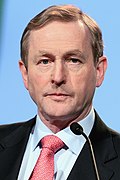National and regional summaries
The governing Fianna Fáil party lost one MEP and a significant share of the vote, in line with the day's other election results. Fine Gael increased its national vote share but lost a seat. The Labour Party, which increased its delegation from one MEP to three, was the only major party to make seat gains. Sinn Féin lost its only MEP in the Republic of Ireland, and the Socialist Party won a seat for the first time. One independent MEP lost her seat. The Green Party's vote was halved, and the pan-European Libertas party, based in Ireland, also failed to make a breakthrough.
In Dublin, Gay Mitchell of Fine Gael and Proinsias De Rossa of Labour were re-elected, while Joe Higgins of the Socialist Party defeated the incumbent Fianna Fáil and Sinn Féin MEPs to take the third seat. In the East constituency, Mairead McGuinness of Fine Gael and Liam Aylward of Fianna Fáil were re-elected. Nessa Childers of Labour took the vacant final seat. North-West re-elected independent ALDE MEP Marian Harkin and Jim Higgins of Fine Gael, while the Fianna Fáil seat was retained by former MEP Pat "the Cope" Gallagher. In South, Brian Crowley of Fianna Fáil was re-elected, Seán Kelly won a seat from his Fine Gael colleague Colm Burke, and Labour's Alan Kelly took the last seat in a tight contest between him, Sinn Féin's Toiréasa Ferris and the incumbent Independent Kathy Sinnott in the final count. [2]
This page is based on this
Wikipedia article Text is available under the
CC BY-SA 4.0 license; additional terms may apply.
Images, videos and audio are available under their respective licenses.







